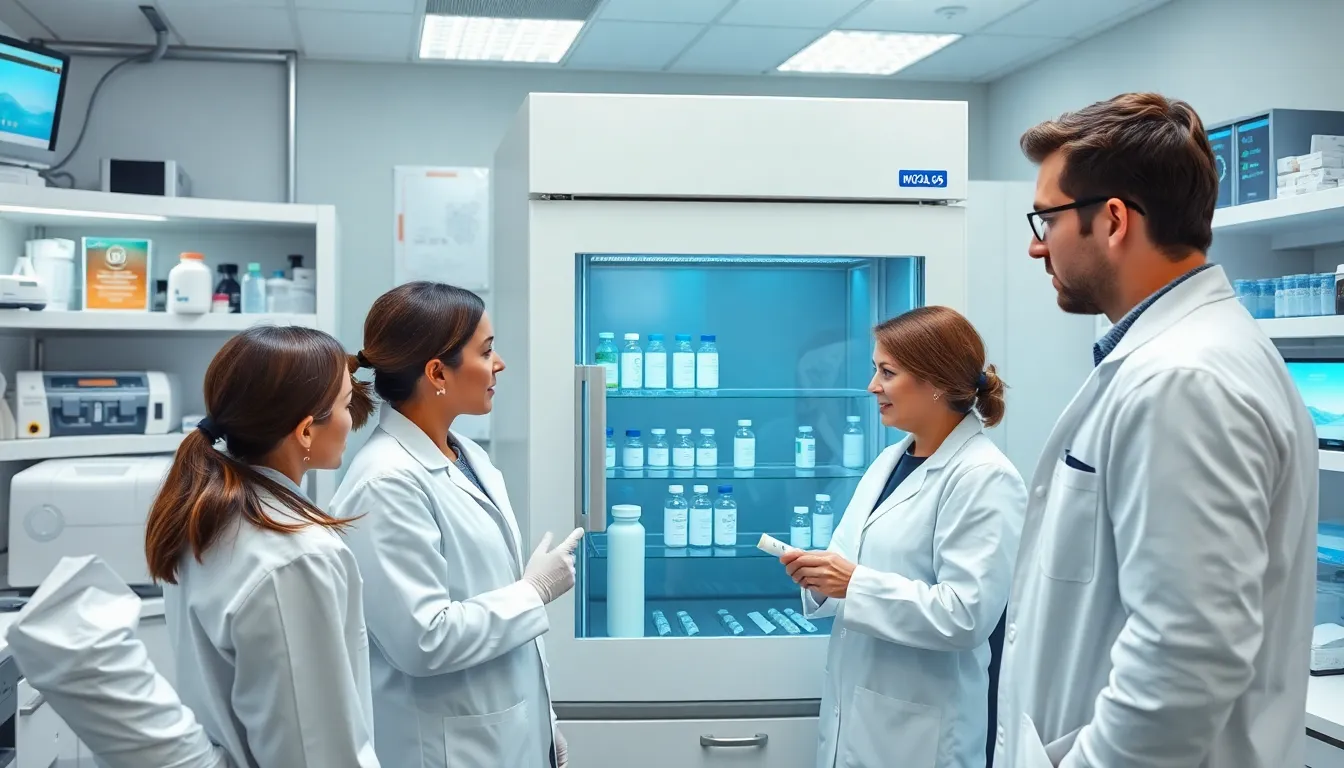
In a world where technology and health collide, high tech pharmaceuticals are the superheroes we didn’t know we needed. Imagine popping a pill that not only cures your ailment but also tracks your health like a fitness app on steroids. These innovations are transforming the way we think about medicine, making treatments more effective and personalized than ever before.
Gone are the days of one-size-fits-all medications. With advancements in biotechnology and data analytics, high tech pharmaceuticals are paving the way for tailored therapies that suit individual needs. It’s like having a custom-made suit for your health—because who wants to wear something off the rack when they can have a perfect fit? Get ready to dive into the fascinating world of high tech pharmaceuticals, where science fiction meets reality and your next prescription might just come with a side of tech-savvy flair.
High-Tech-Pharmaceuticals
High tech pharmaceuticals integrate cutting-edge technology with medical practices to enhance treatment efficacy. These innovations focus on personalized health solutions, moving beyond traditional medications. Precision medicine has gained traction, allowing for tailored therapies based on individual genetic and environmental factors. Advanced data analytics plays a significant role in this transformation, permitting healthcare professionals to predict treatment responses.
Smart drug delivery systems exemplify innovation in this field. These systems release medications precisely when needed, improving adherence and outcomes. Additionally, wearable devices continuously monitor health metrics, providing real-time data that informs treatment decisions. Their use in conjunction with pharmaceuticals has created a feedback loop that benefits patient care.
Combination therapies highlight another significant trend. Such therapies utilize multiple drug components to target complex diseases more effectively. This approach demonstrates a shift toward comprehensively addressing health issues, particularly in chronic conditions like diabetes and cancer.
Further innovations include digital therapeutics, often delivered through mobile applications. These therapies provide behavioral interventions alongside pharmaceuticals, creating a holistic treatment approach. As regulatory agencies adapt to these advancements, they ensure safety and efficacy remain priorities.
The market for high tech pharmaceuticals continues to grow rapidly. According to industry reports, the global high-tech pharmaceuticals market is projected to reach $1 trillion by 2027. This growth signifies the increasing demand for innovative solutions that blend technology with healthcare.
Overall, high tech pharmaceuticals represent a significant evolution in the medical landscape. Their influence pushes boundaries, creating opportunities for improved patient outcomes and more effective treatments.
Innovations in Drug Development

Innovations in drug development showcase the rapid advancement of high tech pharmaceuticals. The integration of technology into medicine enhances treatment options and improves patient outcomes significantly.
Biologics and Biosimilars
Biologics represent a breakthrough in therapeutic options, derived from living organisms and designed to target specific diseases effectively. These complex molecules include therapeutic proteins and monoclonal antibodies, widely used in treating conditions like rheumatoid arthritis and cancer. Biosimilars, highly similar versions of biologics, offer more cost-effective alternatives, expanding patient access to essential treatments. Their approval processes ensure safety and efficacy, making them a crucial aspect of modern pharmaceutical development. As the market for biologics and biosimilars continues to grow, they play an essential role in shaping the future of personalized medicine.
Gene and Cell Therapies
Gene therapies provide opportunities to treat genetic disorders by inserting, altering, or removing genes within an individual’s cells. Techniques such as CRISPR facilitate precise editing, leading to potential cures for conditions like muscular dystrophy and hemophilia. Cell therapies, including stem cell transplants, aim to repair damaged tissues and regenerate healthy cells. They show promise in treating various cancers and neurological disorders. These therapies exemplify the shift toward targeted treatments that address the root causes of diseases, enhancing the capabilities of high tech pharmaceuticals. As advancements progress, the potential for transformative medical interventions expands, reshaping treatment paradigms and improving lives.
Technologies Transforming Pharmaceuticals
High tech pharmaceuticals leverage innovative technologies to enhance medical treatments and patient care. These advancements revolutionize traditional practices and offer more effective solutions.
Artificial Intelligence in Drug Discovery
Artificial intelligence (AI) accelerates the drug discovery process by analyzing vast datasets. Machine learning algorithms identify potential compounds, predict their effectiveness, and streamline the selection of drug candidates. Researchers utilize AI to assess clinical trial data efficiently, improving success rates significantly. AI-driven approaches are already shortening development timelines, often reducing them by up to 50%. The integration of AI into drug discovery not only enhances efficiency but also minimizes costs, providing a substantial economic benefit to pharmaceutical companies pursuing new treatments.
Nanotechnology in Drug Delivery
Nanotechnology optimizes drug delivery systems by enabling precise targeting of medications. Nanoparticles can encapsulate drugs, enhancing their stability and release profiles. This technology permits tailored delivery to specific tissues or cells, which maximizes treatment efficacy. Studies show that nanotechnology can improve bioavailability by up to 10 times for certain drugs, ensuring more of the active ingredient reaches its intended target. Ongoing advancements in nanotechnology promise to transform how medications are administered, reducing side effects and enhancing patient outcomes.
Regulatory Landscape
Regulatory frameworks for high tech pharmaceuticals require strict adherence to guidelines set by authorities such as the FDA and EMA. These organizations oversee the approval process for new therapies that integrate technology with pharmaceuticals. The focus lies on ensuring both safety and efficacy, particularly for innovative treatments.
Compliance with regulations poses challenges for developers of high tech pharmaceuticals. They must navigate complex requirements that govern clinical trials and data management. Navigating these rules can delay the market entry of new therapies and impact investment.
Changes in the regulatory landscape also affect the pace of innovation. Recent discussions around personalized medicine have led to updates that encourage flexible approaches. Such revisions aim to accommodate the unique aspects of high tech pharmaceuticals and precision medicine.
Additionally, regulatory bodies are increasingly scrutinizing data generation and usage. Companies need robust mechanisms to ensure data integrity, especially when using AI and machine learning in drug development. Thorough documentation of algorithms used is essential for transparency and accountability.
Global collaboration among regulatory agencies enhances the approval process for high tech pharmaceuticals. Initiatives like the International Council for Harmonisation establish standards that can simplify cross-border issues. Streamlined processes foster quicker access to innovative treatments in various markets.
Investors look for companies that can demonstrate regulatory compliance as part of their business strategy. A strong track record with regulatory approvals signals reliability and fosters confidence in potential returns. As the market for high tech pharmaceuticals continues to grow, navigating the regulatory landscape becomes increasingly critical for stakeholders.
Future Trends in High Tech Pharmaceuticals
Precision in drug development continues to grow, enhancing the way treatments are tailored. The rise of personalized medicine focuses on individual genetic makeup, making therapies more effective and improving recovery times. Emerging technologies like CRISPR gene editing propel advancements, offering novel solutions for genetic disorders.
Wearable technology enhances patient monitoring, allowing real-time collection of health data. Devices continuously track vital signs, providing critical information that informs treatment decisions. Smartphone applications facilitate communication between patients and healthcare providers, ensuring timely interventions when needed.
Artificial intelligence transforms the drug discovery process. Algorithms analyze vast datasets to identify potential drug candidates faster than traditional methods. Predictive analytics improve success rates of clinical trials, reducing costs and time to market.
Nanotechnology optimizes drug delivery, enhancing bioavailability and minimizing side effects. Nanoparticles can target specific tissues, delivering medications directly to affected areas. This precision offers potential breakthroughs in treating complex conditions like cancer.
Combination therapies reflect a strategic approach to managing multifaceted diseases. Treatments that utilize various drug mechanisms can address multiple disease pathways, improving overall effectiveness. Chronic conditions, such as diabetes, significantly benefit from this trend.
With a projected market value of $1 trillion by 2027, high tech pharmaceuticals are poised for exponential growth. Investments in research and development drive innovation, leading to new treatment modalities. Regulatory agencies are adapting to the evolving landscape, focusing on fast-tracking reviews for breakthrough therapies.
Collaboration among pharmaceutical companies and technology firms fosters innovation. Partnerships enable sharing knowledge and resources, accelerating the development of forward-thinking solutions. These trends illustrate a significant evolution in healthcare, emphasizing the integration of technology and pharmaceuticals for improved patient outcomes.
Conclusion
High tech pharmaceuticals are set to redefine the healthcare landscape. By merging technology with medical advancements, these innovations promise to enhance treatment efficacy and patient outcomes. The shift towards personalized medicine not only addresses individual health needs but also paves the way for more effective therapies.
As the market evolves and embraces new technologies like AI and nanotechnology, the potential for improved drug delivery and tailored treatments grows. The focus on precision medicine and regulatory advancements will ensure safety while fostering innovation. With a projected market value of $1 trillion by 2027, the future of high tech pharmaceuticals looks bright, offering exciting possibilities for both patients and healthcare providers.








